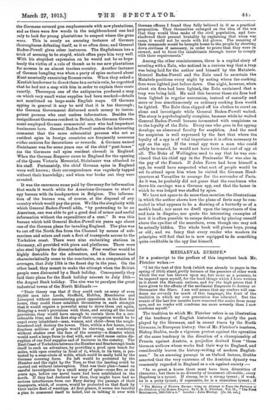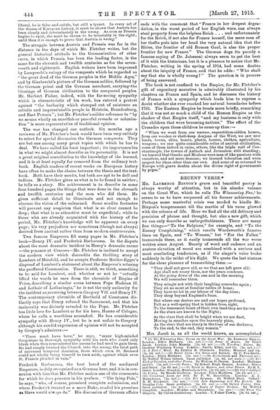MEDIAEVAL EUROPE.'
Ire a postscript to the preface of this important book Mr. Fletcher writes:—
"I
let the text of this book (which was already in pages in the spring of 1014) stand, partly because of the pressure of other work which the war has thrown upon me, but more as a penance, to be imposed upon myself, for the hard things which I have written in it about the Slavonic nations, and for the high praise that I have given to the efforts of the mediaeval Emperor. to destroy or Germanise the Slave. I am well aware that my readers will con- demn me severely for much of this language, the fruit of the tradition in which my own generation was educated. But the events of the last few months have removed Um Belles from many eyes, and no reader will condemn me more severely than 1 now condemn myself."
The tradition to which Mr. Fletcher refers is an illustration of the tendency of English historians to glorify the part played by the Germans, and in recent times by the North Germans, in European history. One of Mr. Fletcher's teachers, Bishop Stubbs, made a vigorous protest against the operation of the same tendency in the direction of a championship of Prussia against Austria, e. prejudice derived from "those German authors whom works find their way to England, and considerably leaven the history-writing of modern English. men." In an amusing passage in an Oxford lecture, Stubbs asserted that the very existence of the Austrian dynasty VMS commonly regarded in England as a air against society In so great a house there must have been diversities of character; but there is no diversity of treatment allowable ; every Hapsburg is a tyrant. If strong. he is a strong tyrant ; if weak, he is a petty tyrant; if repressive, he is a shameless tyrant ; it • rho Mold., of Wootorso Hump.: kiss on A ll000pt to ryes._ nw.P..leres of Oki/droo of Cho Rome Empire. By C. B. L. Fletcher. Vol. IL,Plry Hensis--roe, 1000.1110 5.0." Loudon John Murray. [74. ed. usL3
liberal, he is false and subtle, but still a tyrant. In every act of the drama of European history, it must be shown that Austria has been clearly and determinately in the wrong. As soon as Prussia begins to exist, she must be shown to be invariably in the right ; until then it is enough to prove that Austria is wrong."
The struggle between Austria and Prussia was far in the distance in the days of which Mr. Fletcher writes, but the general historical attitude to the Germanization of other races, in which Prussia has been the leading factor, is the same for the eleventh and twelfth centuries as for the seven- teenth and eighteenth. English writers have been impressed by Lamprechrs eulogy of the conquests which he regarded as " the great deed of the German peoples in the Middle Ages," and by Gisebrecht's picture of the German soldier, followed by the German priest and the German merchant, carryingethe blessings of German civilization to the conquered peoples. Mr. Herbert Fisher, indeed, with the far-seeing sympathy which is characteristic of his work, has entered a protest against "tile barbarity which stamped out of existence an artistic and impressionable people in Holstein, Brandenburg, and East Prussia"; but Mr. Fletcher's milder reference to "by no means wholly an unselfish or peaceful crusade or coloniza- tion" is more representative of traditional opinion.
The war has changed our outlook. Six months ago a reviewer of Mr. Fletcher's book would have been very unlikely to select for special discussion the German conquests. They are but one among many great topics with which he has to deal. We have called his book important ; its importance lies in what we might almost describe as its personality. It is not a great original contribution to the knowledge of the learned, and it is at least equally far removed from the ordinary text- book. English readers of recent works on European history have often to make the choice between the thesis and the text- book. Both have their merits, but both are apt to be dull and tedious. Mr. Fletcher gives us what is to be found in neither; he tells us a story. His achievement is to describe in some four hundred pages the things that were done in the eleventh and twelfth centuries and the men who did them. He gives sufficient detail to illuminate and not enough to obscure the vision of the unlearned. Some erudite footnotes will prevent any suspicion that what is no clear cannot be deep; that what is so attractive must Le superficial; while to those who are already acquainted with the history of the period, Mr. Fletcher's knowledge will be apparent on every page; his very prejudices are sometimes (though not always) derived from ancient rather than from modern controversies.
Two famous Emperors fill many pages iu Mr. Fletcher's book—Henry IV. and Frederick Barbarossa. In the dispute about the most dramatic incident in Henry's dramatic career —the penance at Canossa—Mr. Fletcher is inclined to accept the modern view which discredits the thrilling story of Lambert of Hersfeld, and be accepts Professor Holder-Egger's disproof of Lambert's statement about the Emperor's refusing the proffered Communion. There is still, we think, something to be said for Lambert, and, whether or not he "actually lifted the words lie uses from the chronicle of Begin° of Priim,describing a similar scene between Pope Hadrian II. and Lothair of Lotharingia," he is not the only authority for the incident as occurring between Gregory VII. and Henry IV. The contemporary chronicle of Berthold of Constance dis- tinctly says that Henry refused the Sacrament, and that his insincerity was divinely revealed to the Pope. Mr. Fletcher has little love for Lambert or for his hero, Hanno of Cologne, whom he calls a worthless scoundrel. He has considerable sympathy with Henry IV., but he is not unfair to Gregory although his candid expression of opinion will not be accepted by Gregory's admirers :— "There must have been." he says, "many high-minded Gregorians in thorough sympathy with his ends who could only blush when they remembered the means ho hail used to gain them. He had simply twisted the Church into the wrong, the fatal path of universal temporal dominion, from which even St. Bernard could not wholly bring himself to turn aside, against which even St. Francis pleaded in vain."
Frederick 13arbarossa, the best loved of the mediaeval Emperors, is duly recognized as a German hero, and it is in con- nexion with him that Mr. Fletcher makes one of the comments for which lie does penance in his preface. " The lying Pole," lie says, "who, of course. promised complete submission, and whom Frederick treated as a mere Duke, evaded his promises as Slays would always do." His discussion of German affairs
ends with the comment that "France in her deepest degra- dation, in the worst period of her English wars, can always. steal property from the helpless Reich . . and unfortunately for the Reich, if not also for France herself, the mere ease or her thefts puts into her head the very natural idea that the Rhine, the frontier of old Roman Gaul, is also the proper frontier for new France." The German doge (to parody a. famous saying of Dr. Johnson) always seem to get the best. of it with the historians, but it is a pleasure to notice that Mr.. Fletcher, writing in the spring of 1914, had some doubts. about the iniquity of France, and that he adds: " Who shall say that she is wholly wrong?" The question is in process. of being answered.
The book is not confined to the Empire, for Mr. Fletcher's, gift of expository narrative is admirably illustrated by his chapters on France and Spain, and he dismisses the history of France with a sympathy which leads him to express a. doubt whether she ever reached her natural boundaries before. 1795. The Eastern Empire be treats more briefly, remarking; that it was not so much a child of the Roman Empire as the shadow of that Empire itself, "and my business is only with. the children that were becoming nations." The effect of the Crosadea upon those children he slams up thus "When we went from our narrow, superstition-ridden homes,. from our wooden or shell-keep donjons of the West, we saw new lands, towns, skies, beasts, plants, houses, clothes, agriculture. weapons; we saw quite considerable relics of ancient civilisation, some of them indeed in ruins, others, like the triple wall of Con- stantinople, the towers of Antioch and Jerusalem. still standing; eve learned that Greeks and Moslems were men of like passions with ourselves, and not mere demons ; we learned toleration and even respect for ideas other than our own. And some of us returned to Europe with grave doubts about the divine right of government by P.P..,"







































 Previous page
Previous page